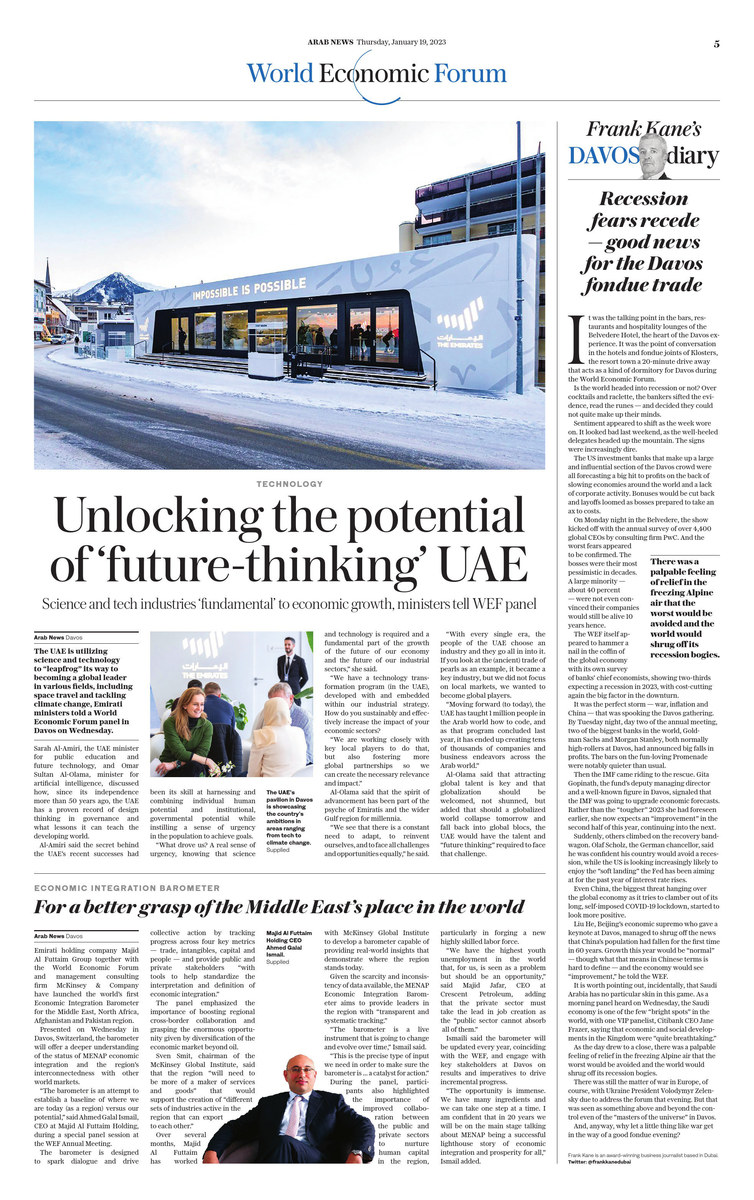DAVOS: Emirati holding company Majid Al Futtaim Group together with the World Economic Forum and management consulting firm McKinsey & Company have launched the world’s first Economic Integration Barometer for the Middle East, North Africa, Afghanistan and Pakistan region.
Presented on Wednesday at WEF Annual Meeting in Davos, Switzerland, the barometer will offer a deeper understanding of the status of MENAP economic integration and the region’s interconnectedness with other world markets.
“The barometer is an attempt to establish a baseline of where we are today (as a region) versus our potential,” said Ahmed Galal Ismail, CEO at Majid Al Futtaim Holding, during a special panel session at WEF.
The barometer is designed to spark dialogue and drive collective action by tracking progress across four key metrics — trade, intangibles, capital and people — and provide public and private stakeholders “with tools to help standardize the interpretation and definition of economic integration.”
The panel emphasized the importance of boosting regional cross-border collaboration and grasping the enormous opportunity given by diversification of the economic market beyond oil.
Sven Smit, chairman of the McKinsey Global Institute, said that the region “will need to be more of a maker of services and goods” that would support the creation of “different sets of industries active in the region that can export to each other.”
Over several months, Majid Al Futtaim has worked with McKinsey Global Institute to develop a barometer capable of providing real-world insights that demonstrate where the region stands today.
Given the scarcity and inconsistency of data available, the MENAP Economic Integration Barometer aims to provide leaders in the region with “transparent and systematic tracking.”
“The barometer is a live instrument that is going to change and evolve over time,” Ismail said.
“This is the precise type of input we need in order to make sure the barometer is...a catalyst for action.”
During the panel, participants also highlighted the importance of improved collaboration between the public and private sectors to nurture human capital in the region, particularly in forging a new highly skilled labor force.
“We have the highest youth unemployment in the world that, for us, is seen as a problem but should be an opportunity,” said Majid Jafar, CEO at Crescent Petroleum, adding that the private sector must take the lead in job creation as the “public sector cannot absorb all of them.”
Ismaili said the barometer will be updated every year, coinciding with the WEF, and engage with key stakeholders at Davos on results and imperatives to drive incremental progress.
“The opportunity is immense. We have many ingredients and we can take one step at a time. I am confident that in 20 years we will be on the main stage talking about MENAP being a successful lighthouse story of economic integration and prosperity for all,” Ismail concluded.

















